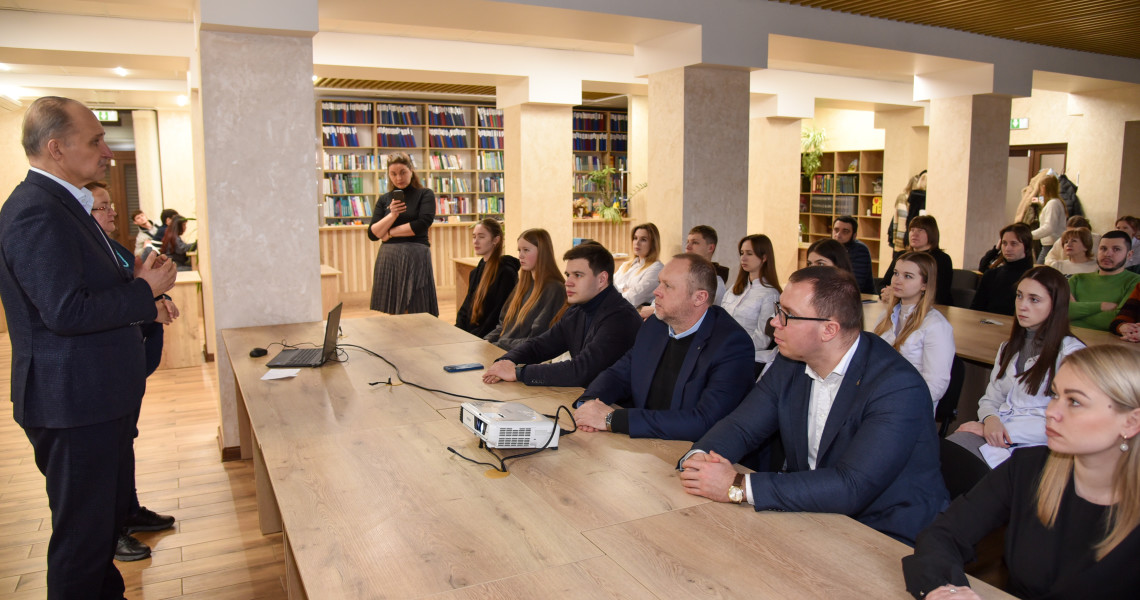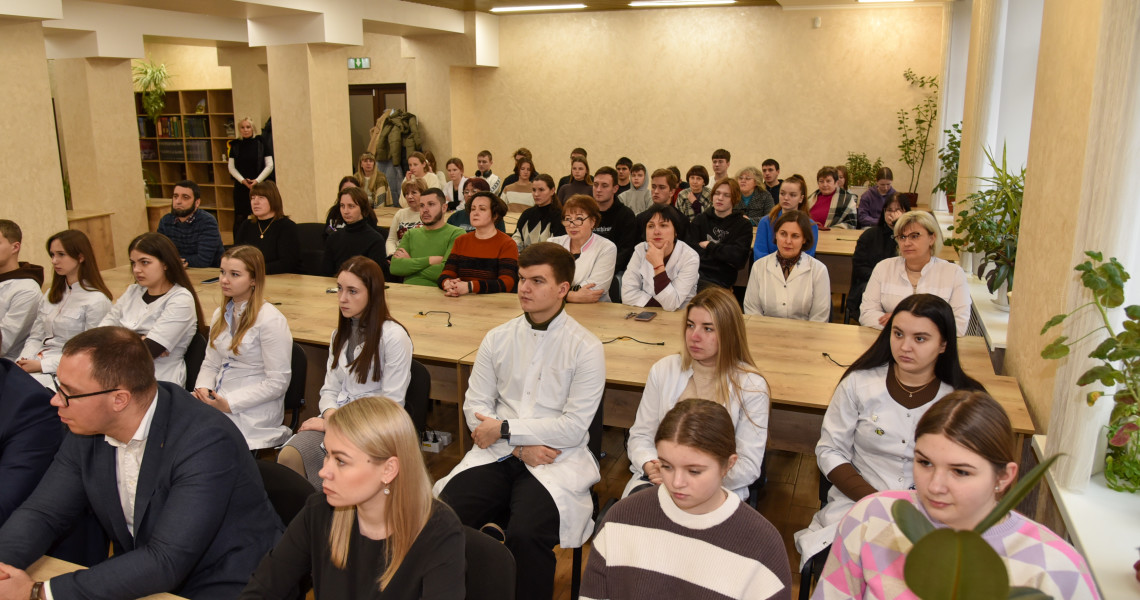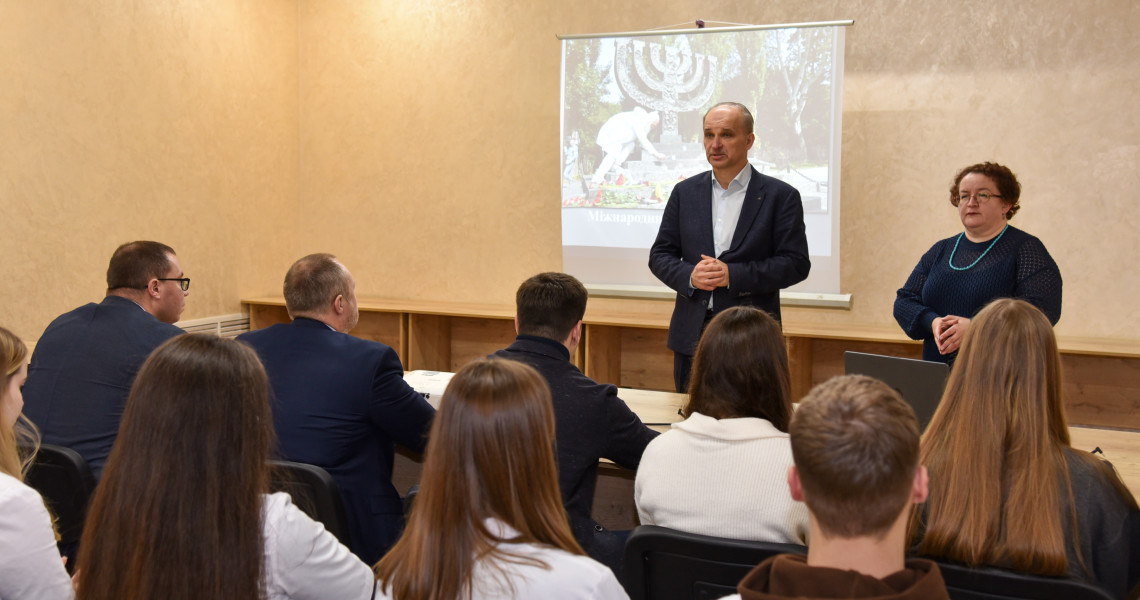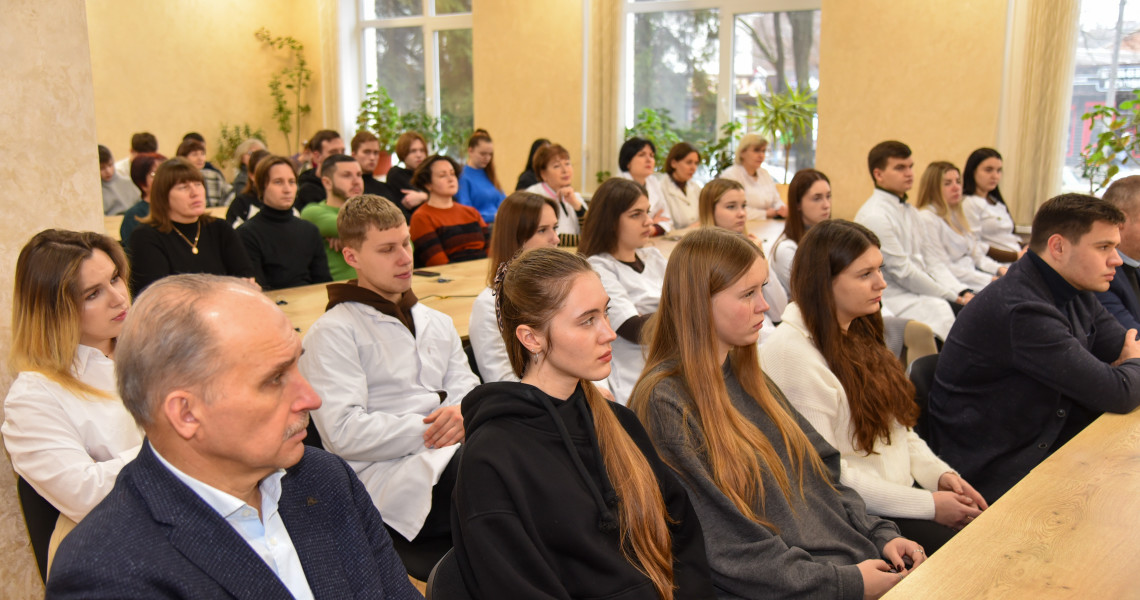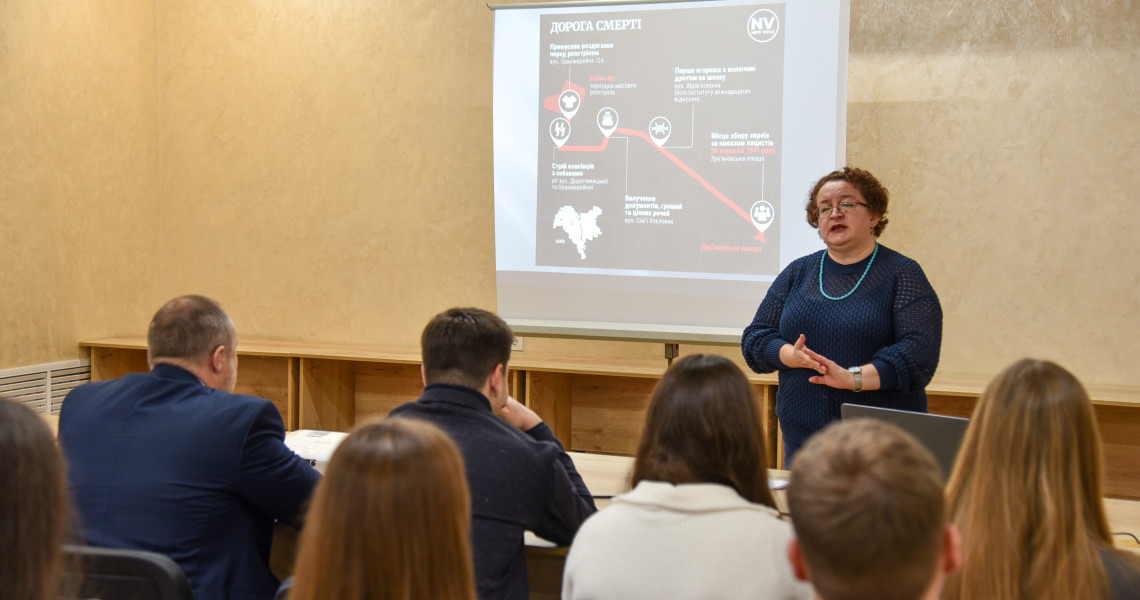27 січня 2025 року в Полтавському державному медичному університеті вшанували пам’ять жертв Голокосту – однієї з найтрагічніших сторінок в історії людства. Цей день особливий тим, що саме 27 січня 1945 року солдати 1-го Українського фронту звільнили в’язнів нацистського табору смерті Аушвіц-Біркенау в Освенцимі.
У заході, присвяченому цій пам’ятній даті, взяли участь студенти, викладачі та співробітники університету. Зі вступним словом виступив проректор з науково-педагогічної та виховної роботи, професор Валерій Похилько: "Це сумна дата в історії, але ми повинні її пам’ятати. Сьогодні ми знову стикаємося з проявами геноциду – проти українського народу, нашої самобутності, згадаймо Оленівку, Бучу… Ми зібралися тут, щоб почути історичні дослідження й замислитися над тим, як запобігти повторенню таких трагедій у майбутньому».
Ключовим моментом заходу став виступ старшої наукової співробітниці Полтавського краєзнавчого музею імені В. Кричевського Наталії Кузьменко. Вона звернула увагу присутніх на зв’язок між трагічними подіями минулого – Голодомором та Голокостом. Дослідниця зазначила, що одним із перших почав досліджувати цю тему польсько-американський єврей і автор терміну "геноцид" Рафаель Лемкін, він же ініціював ухвалення у 1948 році Конвенції ООН про запобігання цьому злочину.
У своїй доповіді Наталія Кузьменко розповіла, що Голокост, який тривав із 1933 по 1945 роки, розпочався з дискримінації та маргіналізації єврейських громад, а завершився масовими розстрілами, трудовими таборами й знищенням мільйонів життів. Окрім євреїв, жертвами стали також роми, представники релігійних громад і сексуальних меншин.
Доповідачка також підкреслила, що безкарність ігнорування трагедії Голодомору створила прецедент для наступних злочинів проти людяності. Вона застерегла: якщо світ і надалі не реагуватиме на сучасні злочини проти українського народу, то ризикує зіштовхнутися з подібними загрозами у майбутньому.
Події Голокосту вражають своєю жорстокістю та величезною кількістю жертв. Вони є нагадуванням про наслідки байдужості й ненависті. Уроки цих трагедій повинні стати основою для формування суспільства, яке цінує життя, права та гідність кожної людини.
Особливо важливо, щоб молоде покоління усвідомлювало: сьогоднішня боротьба України також спрямована на захист цих цінностей. Пам’ять про історичні трагедії повинна мотивувати світ до рішучих дій на підтримку справедливості та свободи.
У заході взяли участь здобувачі освіти фахового медико-фармацевтичного коледжу ПДМУ, викладачі кафедр фармакології та анатомії, представники студентської профспілки й парламенту, бібліотекарі та працівники відділу управління виховної та гуманітарної роботи з молоддю.
January 27 is International Holocaust Remembrance Day: historical lessons and modern challenges
On January 27, 2025, Poltava State Medical University commemorated the victims of the Holocaust, one of the most tragic pages in the history of mankind. This day is special because it was on January 27, 1945, that the soldiers of the 1st Ukrainian Front liberated the prisoners of the Nazi death camp Auschwitz-Birkenau in Auschwitz.
The event dedicated to this memorable date was attended by students, faculty, and staff of the university. Vice-Rector for Academic Affairs and Extracurricular Activities, Professor Valerii Pokhylko made an opening speech: “This is a sad date in history, but we must remember it. Today we are again faced with manifestations of genocide - against the Ukrainian people, our identity, let's remember Olenivka, Bucha... We have gathered here to hear historical research and think about how to prevent such tragedies from happening again in the future.”
The keynote of the event was a speech by Natalia Kuzmenko, a senior researcher at the V. Krychevsky Poltava Museum of Local Lore. She drew the audience's attention to the connection between the tragic events of the past-the Holodomor and the Holocaust. The researcher noted that one of the first to study this topic was Raphael Lemkin, a Polish-American Jew and author of the term “genocide,” who also initiated the adoption of the UN Convention on the Prevention and Punishment of this crime in 1948.
In her report, Natalia Kuzmenko said that the Holocaust, which lasted from 1933 to 1945, began with discrimination and marginalization of Jewish communities and ended with mass shootings, labor camps, and the destruction of millions of lives. In addition to Jews, the victims included Romany, representatives of religious communities and sexual minorities.
The speaker also emphasized that the impunity for ignoring the Holodomor tragedy set a precedent for subsequent crimes against humanity. She warned that if the world does not continue to respond to the current crimes against the Ukrainian people, it risks facing similar threats in the future.
The events of the Holocaust are striking in their cruelty and huge number of victims. They are a reminder of the consequences of indifference and hatred. The lessons of these tragedies should serve as the basis for building a society that values the life, rights, and dignity of every human being.
It is especially important for the younger generation to realize that Ukraine's current struggle is also aimed at protecting these values. The memory of historical tragedies should motivate the world to take decisive action in support of justice and freedom.
The event was attended by students of the PSMU Professional College of Medicine and Pharmacy, professors of the Departments of Pharmacology and Anatomy, representatives of the Student Union and Parliament, librarians and employees of the Department of Educational and Humanitarian Work with Youth.






